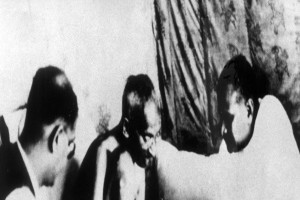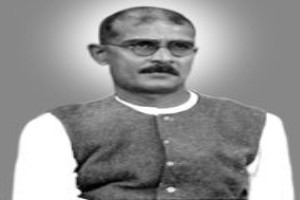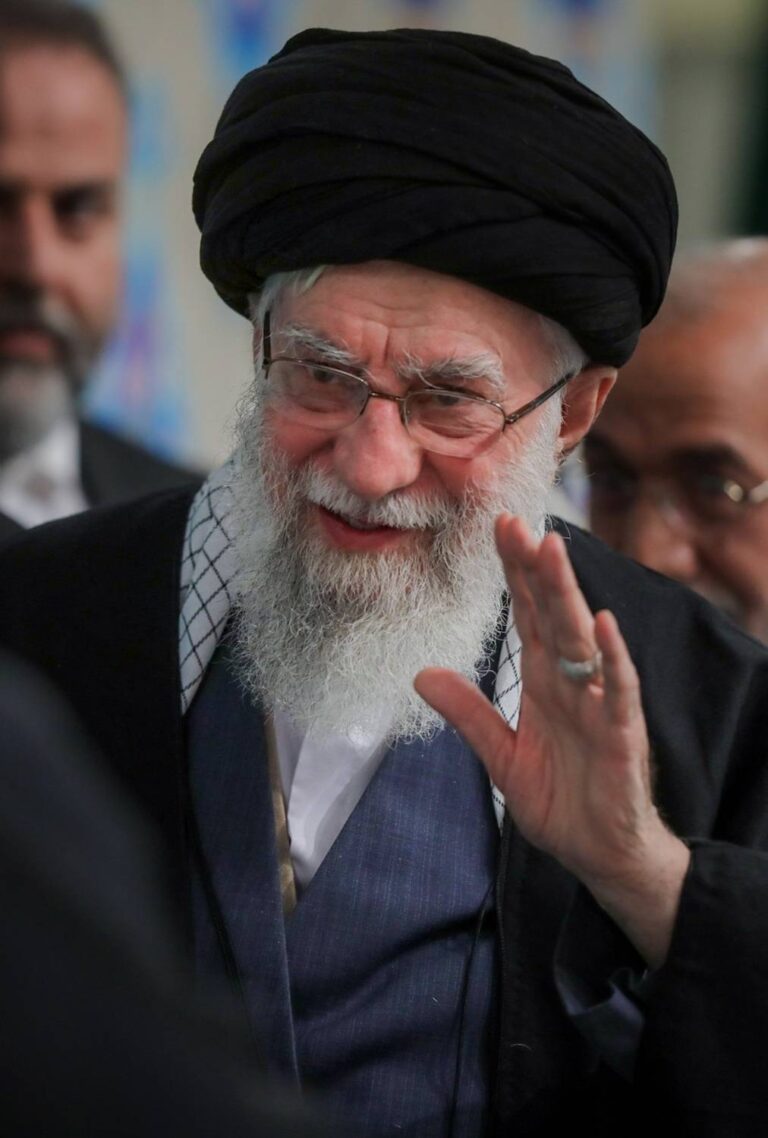
Mahadev Desai, Mahatma Gandhi and Jamnalal Bajaj. Photo courtesy Nachiketa Desai
History Recalled
 By Mahadev Desai*
By Mahadev Desai*
(This article was published in Harijan on February 22, 1942)
When Gandhi wrote two letters to Jamnalal
“We are monarchs of the domain of Effort. God is sole Monarch of the domain of Result.”
Like some of those rare men who are gifted with the power of sublimating their desires and their passions, Jamnalal Bajaj was gifted with the power to sublimate his sense of possession. He followed the master cheerfully through all the numerous vicissitudes of the latter’s life, because although ‘he had great possessions’, he had divested himself of the sense of proprietorship in them.
Born of an obscure family in a waterless village in Jaipur State, he was adopted by a rich man from the same State who had settled in Wardha. Even the poor parents would not part with their child, until the rich Bachhrajji from Wardha promised to dig a well in the village. The boy was brought up by the adoptive father, and after two or three years in a Hindi school was put into business. Once he incurred the rage of this hot-tempered father who reminded him of the riches he had come into possession of without labouring for them. He was just 17 then. He addressed a letter to the father couched in terms of humility and firmness characteristic of the Jamnalalji of future years. The letter is in Marwari, and some of the idiom of the language is untranslatable. But the substance may be given here:
“You were so angry with me today. It was God’s will, and you had a right to be angry in that you have adopted me. It is not your fault, rather is it the fault of those who gave me in adoption. The money is yours, and you may do whatever you like with it. I am sorry for the expenses you have incurred on me so far, but from this moment I will not touch a pie out of your money. I have no right against you, and I would implore you not to be anxious about me. May God keep you for many more years. Wherever I go I shall pray for your welfare. Pray pardon me for having irritated you. I hope you never believed that I served you because of your money. Please dismiss that thought from your mind, if you ever had it. I care not for wealth, I pray that I may never forget the name of God who alone can keep me happy in this and in the next life. And pray be of good cheer and don’t sorrow over my going. All earthly relationship is hollow. The worldly possessions hold you in their grip. And please rest assured that I will not go to law to claim a pie of what is yours. This is a regular release-deed on a stamped paper, and it declares that you owe me no obligation whatsoever. I owe no debts that you need repay. Use your money in charity, swear not at sadhus and others, as is your wont, but please offer them with whatever money you can give. I am taking nothing from the house – nothing but the clothes that cover me.”
Also read: History Recalled: When Gandhiji attended Royal reception
The father relented, implored the son tearfully to stay, and he stayed. Sturdy commonsense and innate business skill enabled him to earn lakhs and give in charity five times the wealth he had inherited from the adoptive father. If he stayed home in response to the father’s implorations, he knew he was a trustee of the father’s wealth. Consciously or unconsciously that was his first lesson in the theory of trusteeship. The father who had adopted him taught that first lesson, the father he later adopted (Gandhiji) initiated him into the deep implications of it.
Similarly he had the virtue of fearlessness which the absence of a slavish education had left unimpaired. He had silenced Tommies travelling first and second and trying to bully him; he would not serve wines at a party he gave in honour of a Governor; to a Commissioner who said that the Chief Commissioner would not open his school unless he promised to be more loyal, he had said he would do without that costly privilege, and to a D.S.P. whom he was interviewing and who had remarked: “How I wish the boat that is carrying Tilak to England may go to the bottom of the sea,” he had said: “You forget that there are numerous Englishmen on the boat!”
This fearlessness came into full play during the twenty years of his public life under Gandhiji’s leadership. President Kruger was unlettered and Generalissimo Chiang Kai-shek knows no English. Ignorance of English was no handicap to them. It had in fact left the native vigour of their minds unspoilt. Even so with Jamnalalji. He could see the implications of an intricately worded Congress resolution quicker than many other members, and he would often raise his warning voice lest the Committee should put their foot into seemingly innocent propositions. It was he who raised earliest the question of moral and material co-operation in the war and who said that a nation of shopkeepers could not be duped by the promise of moral co-operation.
Treasurer of the nation’s wealth he was also the treasurer of the nation’s honour. He was among the very few capitalists who recklessly threw themselves in the fray for the nation’s freedom and bore the rigours of imprisonment every time the call was made. His faith burnt brightest when that of others flickered in times of stress and strain and dark despair. It was to revive the faith of others that when Gandhiji was in jail under a six years’ term of imprisonment that he donated Rs. 2,50,000 and founded the Gandhi Seva Sangh.
Politics he could understand, but he often regarded it as a sorry game which might soil one’s heart and soul. And so he had early set his heart on the constructive part of the Congress programme: Khadi to which he gave his wealth, his time, his organising ability and his devotion; Harijan uplift for which he risked the wrath of his hide-bound community, threw open the first big temple in India to the Harijans, and gave to Gandhiji the whole of the income of the Harijan village – Sevagram – for the Harijans’ welfare; Hindu-Muslim unity for which he cheerfully bore heavy blows in the course of a riot, and earnestness for which won him distinguished men like the Khan Sahebs as brothers and women like Raihanaben and the Captain sisters as sisters; Village industries for which he gave away a precious part of his patrimony; Women’s cause to which he devoted a good deal of his wealth and time; and the Cow to whose cause he dedicated his life.
Who could have been blessed with a richer life of service? And yet one could notice in various utterances of his a longing for something he had not yet achieved. His sense of truth and justice was keen even to harshness, so far at any rate as he was concerned. Before he met Gandhiji he had worshipped at many shrines. Gandhiji seemed to settle his mind, and Gandhiji’s fierce passion for truth made him long to be his son. “Blessed will be the moment when I shall be worthy of being known as Mahatmaji’s son,” he wrote in 1923. “It is due to his infinite mercy that I have learnt at least to see my weaknesses and failings.” He was often overwhelmed by a sense of his spiritual shortcomings, and he often longed to retire from all public activities. It was this spirit that endeared him to Gandhiji more than the sacrifice of material possessions, almost incomparably great as this was. And that was what made him the proud recipient of two characteristic letters from Gandhiji written from jail. In one of these he wrote:
“As I proceed in my search for truth it grows upon me that Truth comprehends everything. It is not in ahimsa, but ahimsa is in it. What is perceived by a pure heart and intellect is truth for that moment. Cling to it, and it enables one to reach pure Truth. There is no question there of a divided duty. But often enough it is difficult to decide what is ahimsa. For instance, the use of disinfectants is himsa, and yet we cannot do without it. We have to live a life of ahimsa in the midst of a world of himsa, and that is possible only if we cling to truth. That is how I deduce ahimsa from truth. Out of truth emanate love, tenderness, humility. A votary of truth has to be humble as the dust. His humility increases with his observance of truth. I see this every moment of my life. I have a much more vivid sense of truth and of my own littleness than I had a year ago. The wonderful implication of the great truth ‘Brahma satyam jaganmithya’ (Brahman is real, all else unreal) grows on me from day to day. It teaches us patience. This will purge us of harshness and add to our tolerance. It will make us magnify the mole-hills of our errors into mountains, and minimise the mountains of others’ errors into mole-hills. The body persists because of egoism. The utter extinction of the body of egoism is moksha. He who has achieved this will be the very image of Truth, or one may call it Brahman.
“Therefore the loving name of God is Dasanudas (servant of servants). Wife, children, friends, possessions – all should be held subservient to Truth. Each one of these should be sacrificed in the search for Truth. Only then can one be a satyagrahi. I have thrown myself into this movement with a view to making the observance of this principle comparatively easy, and it is with the same/ object that I do not hesitate to plunge men like you in it. Its outward form is Hind Swaraj. This Swaraj is being delayed because there is yet to be found a satyagrahi of that type. This, however, need not dismay us. It should spur us on to greater effort.”
And another:
“Moksha is liberation from impure thought. Complete extinction of impure thought is impossible without ceaseless penance. There is only one way to achieve this. The moment an impure thought arises, confront it with a pure one. This is possible only with God’s grace, and God’s grace comes through ceaseless communion with Him and complete self-surrender. This communion may in the beginning be just a lip repletion of His name even disturbed by impure thoughts. But ultimately what is on the lips will possess the heart. And there is another thing to bear in mind. The mind may wander, but let not the senses wander with it. If the senses wander where the mind takes them, one is done for. But he who keeps control of the physical senses will someday be able to bring impure thoughts under control…. Impure thoughts need not dismay you. We are monarchs of the domain of Effort. God is sole Monarch of the domain of Result … You know what to do to create a pure atmosphere about you. Spare diet, sight fixed on the earth below, and impatience with oneself to the extent of plucking the eye out if ‘it offends thee’.”
Nourished on food like this, he grew from self-introspection to more self-introspection. Constant companionship with Vinoba, who had managed the Satyagrahashram at Wardha since the beginning, was a great help in the process. He had immense self-confidence. He knew that, if some day the corn of thorns of Congress Presidentship were to be bestowed on him, he would be equal to the burden. But his heart quailed when he thought of the spiritual journey he had still to do before entering the Kingdom of Heaven. It was not because he had riches. Ownership in these he had cast away, but there were other things needed. And in order to purge himself of all dross he took the greatest step of his life – dedicating himself to the service of the cow. He left his house – the house which had lodged guests like Presidents of the Congress, Lord Lothian, H.E. Tai Chi Tao, Dr. John Mott, and the Egyptian delegation – and went to live in a hut which he called Gopuri. Here he did his spinning, tended his cows with the devotion of King Dileepa, and kept a careful record of his thoughts and acts from day to day. As we visited the hut on the day he passed away we saw on the little desk in front of his feet his diary written up complete to the day of his death. Even so his life was complete and regular and God-fearing. He had dedicated this to Mother Cow, in order that she may be for him the Kamadugha (fulfiller of all desires) that Cow Nandini had been to King Dileepa. Whether the death that came to him was the blessing given him by the Cow it is difficult to say. Perhaps it was, for no death could be more desirable. Almost until the last moment he was thinking of his Cow and his Gopuri, and when the end came it was so sudden and so quick that it seemed as though he had slipped into blissful peace. But whether the Cow had really proved his Kamadugha, there is no doubt that by his dedicated life he had rendered himself Gandhiji’s Kamadugha. It was he who had made it possible for Gandhiji to settle first in Wardha and then in Sevagram, and it was he who was the living link between the outside world and Gandhiji. His death removes the link and leaves both Gandhiji and the outside world much poorer.
*Mahadev Desai was an eminent freedom fighter and Mahatma Gandhi’s personal secretary; article courtesy his grandson, Nachiketa Desai.






Heya, I’m for the first time here. I came across this board and I find It truly useful & it helped me out much. I hope to give something back and aid others like you aided me.
Write more, thats all I have to say.